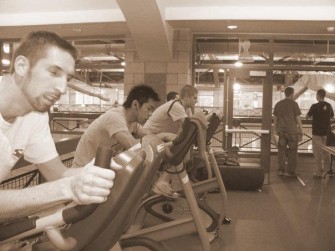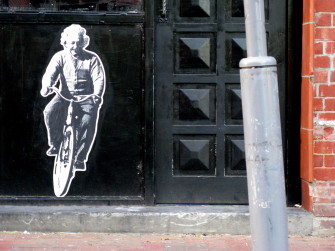
Cyclists are Smarter: Exercise and Brain Activity
Studies routinely show that exercise is good for the brain.
Being the smug, happy bunch that cyclists are, we always knew that we were smarter than the rest. Why else would we opt for the quickest form of transport to get from A to B? And how come rising oil prices and insurance costs never make it to our dinner table conversation?
Well if you need some science to back up your higher levels of intelligence, look no further. The media has been highlighting some interesting studies which show that cycling and brain activity go hand in hand.
Article Update 24/01/2012
Our Belgian Members, GRACQ, also reminded of us of a 2011 Spanish Study which demonstrated that children that cycle to school achieve better results than those that don't. Definitely a study worth looking at!

At the end of last year, the New York Times reported on an Irish experiment in which male college students took part in a memory test followed by strenuous exercise. After being given a lineup of photos with the names of strangers, participants then had to put names to photos. The test was then repeated but with a difference: half of the students rode stationary bicycle for 30 minutes while the rest sat quietly. When it came time for a second memory recall, it was reported that “the exercised volunteers performed significantly better on the memory test than they had on their first try, while the volunteers who had rested did not improve”.
Alright you may say. This is a study about males and we’re completely overlooking half of the world’s population.
But regular exercise has benefits for women too. Some new research from the University of Georgia showed that increased exercise can reduce anxiety in women. Looking at 30 women aged 18-37, those that undertook 6 weeks of strength or aerobic exercise training saw a sizeable reduction in worry symptoms and moderate-to-large improvements in other symptoms, such as irritability, feelings of tension, low energy and pain.
“Our findings add to the growing body of evidence of the positive effects of exercise training on anxiety,” said researcher and doctoral student Matthew Herring.
So not only does cycling make you smarter, but it’s also good for your mental health. In fact when it comes to health and cycling, pedal power ticks just about every box. I asked my colleague, Dr. Randy Rzewnicki, (Project Manager & ECF Representative to DG SANCO) what he thought about the synergy between cycling and health.
“These studies add to the body of knowledge about health benefits. Regular cycling, such as commuting, is good for so many facets of health, from weight control to preventing heart disease and diabetes, to helping you sleep well. There’s hardly anything cycling isn’t good for” Rzewnicki tells me.
What's ECF doing?
ECF has recently commenced working on collaboration strategy together with IACO. The idea is to share as much knowledge as possible and to complement each other at events as well as cooperate when it comes to putting everyday physical activity on the health agenda. For more on ECF’s policy on health see: http://ecf.com/health-and-environment/physical-activity/
“It’s good for life expectancy; it lets you live longer, with a higher quality of life. And not just more days in your life, but more life in your days”.
So cyclists’ aren’t only smarter, happier and healthier, they also live longer. Some studies go as far as saying cycling 30 minutes a day can add 1-2 years onto your life.
Best of all, we all cycle in the ECF offices because we enjoy it and it’s the quickest, easiest way to get around Brussels. Improved health and cognitive skills are merely glorious byproducts.
About the Author
Julian Ferguson is the Communications Officer for the European Cyclists’ Federation. Originally hailing from Australia and a keen bicycle advocate, he plans one day to ride his bicycle from Brussels to Melbourne
Contact the author
Recent news!
Upcoming events
Contact Us
Avenue des Arts, 7-8
Postal address: Rue de la Charité, 22
1210 Brussels, Belgium











